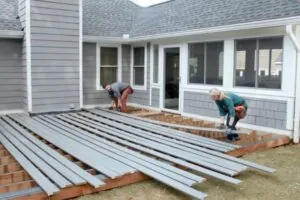A pool deck is the foundation of your outdoor space for fun in the sun. It is a functional space and an area that adds aesthetic value to your poolside leisure. Whether it involves rock, wood, brick, or a custom blend, the materials chosen for a pool deck can transform a simple backyard into a stylish retreat. In this article, you will uncover the details of selecting the ideal pool decking options to enhance the beauty and functionality of your pool area. Let the journey to a relaxing outdoor oasis begin.
Key Takeaways:
● Pool Deck Purpose: Enhances the functionality, safety, and aesthetics of your pool area, improving drainage and boosting property value.
● Material Options: Choices include pavers, concrete, wood, stone, composite, tile, and artificial turf, each with unique benefits like durability, maintenance, and appearance.
● Yard Considerations: Soil type, yard slope, and utility access impact decking stability and functionality.
● Decking Benefits: Improves safety with non-slip surfaces, creates lounging areas, and enhances overall pool usability.
● Key Factors: Durability, maintenance, aesthetics, and proper timing are crucial when selecting pool decking materials.
● Privacy & Regulations: Material choice affects privacy and must comply with local building codes to ensure safety.
I. What Is a Pool Deck and What Is Its Purpose?
A pool deck surrounds a swimming pool, often constructed from wood, concrete, or stone materials. Its primary role is to provide a practical and safe area for various activities, such as lounging, walking, and entertaining. By adding a pool deck, homeowners can significantly enhance their pool area, making it more inviting and functional for relaxing or hosting gatherings.
Beyond aesthetics, a pool deck offers practical benefits, including improved drainage to prevent water accumulation and reduce slip hazards. It also helps protect the pool’s edge and surrounding landscaping from wear and tear. A well-designed deck can complement your home’s exterior, boosting curb appeal and potentially increasing property value. In summary, a pool deck enhances your pool’s enjoyment and usability and contributes to your outdoor space’s overall functionality and attractiveness.
II. What Are the Top Pool Decking Options?
Choosing suitable materials from the various pool decking options involves balancing appearance and practical use. Materials like concrete and travertine offer different benefits, including heat retention, mildew resistance, and overall suitability for poolside conditions. Selecting the appropriate pool deck material ensures safety and durability and enhances your overall pool experience.
A. Pavers
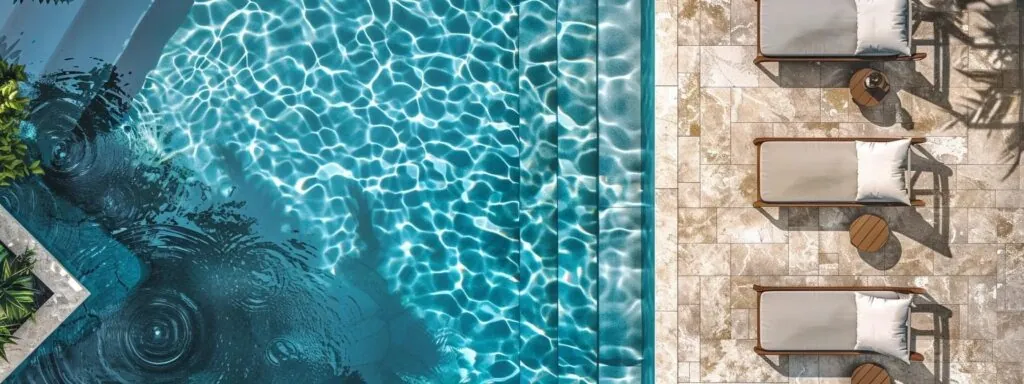
Pavers offer flexibility in pool decking with various styles, from classic brick to modern porcelain tiles. They can be arranged in different patterns to match your patio and pool area, providing visual appeal and functionality. Porcelain pavers, in particular, are known for their low water absorption, durability, and resistance to pool chemicals, making them a reliable choice for maintaining safety and appearance over time.
B. Concrete
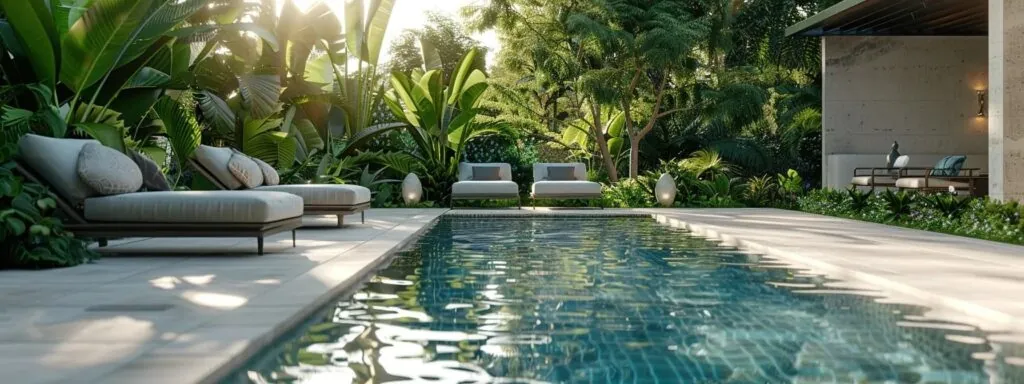
Concrete is one of the popular pool decking options due to its durability and customization options. It can be colored and textured to fit various outdoor styles and is known for its resistance to wear and tear. Unlike materials that may hide soil shifts, concrete displays any issues promptly, allowing for easy maintenance. Advances in finishing techniques now allow concrete to mimic the look of more expensive materials while providing greater functionality.
C. Wood
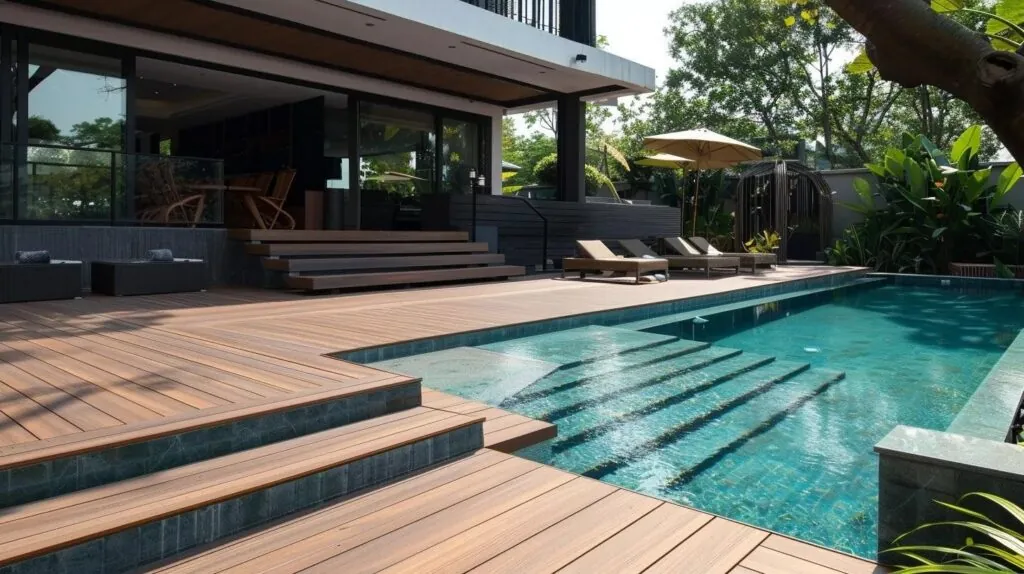
Wood decking adds a natural and warm touch to pool areas, with options like teak, cedar, and mahogany providing both elegance and durability. However, wood requires regular maintenance to protect against weather damage and ensure its longevity.
Unlike other materials, wood needs periodic treatment to prevent water damage and maintain its appearance. It is suitable for those who appreciate its natural beauty and are willing to invest in upkeep.
D. Stone
Stone decking is valued for its durability and timeless aesthetic, offering a high-end look for pool areas. Materials like slate provide a slip-resistant surface that is also mold-resistant, ensuring safety and longevity.
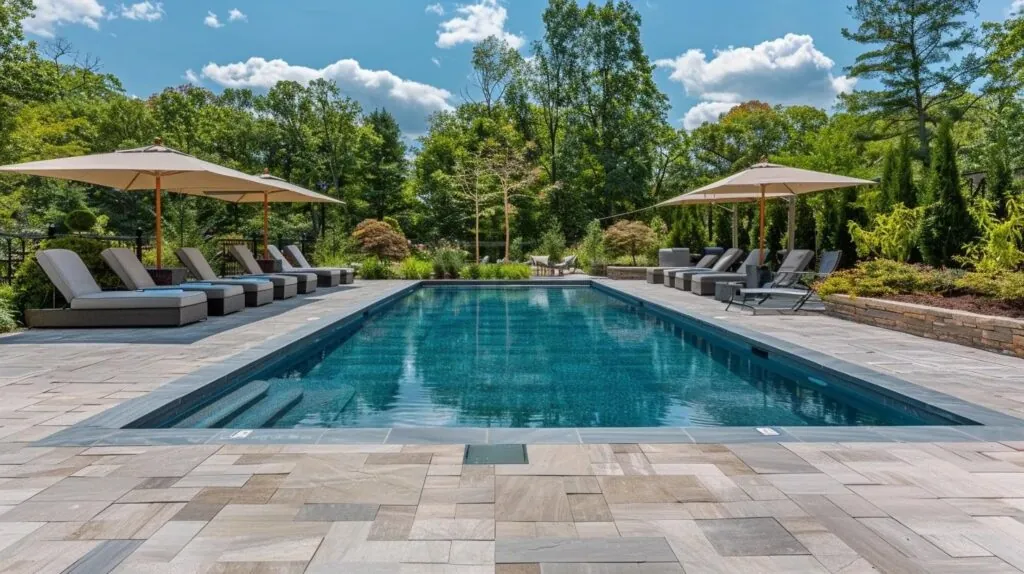
Stone’s natural appeal and minimal maintenance requirements make it a preferred option for homeowners seeking an elegant and lasting poolside design. It is a diverse and popular option that looks stunning in many settings and layouts.
E. Composite
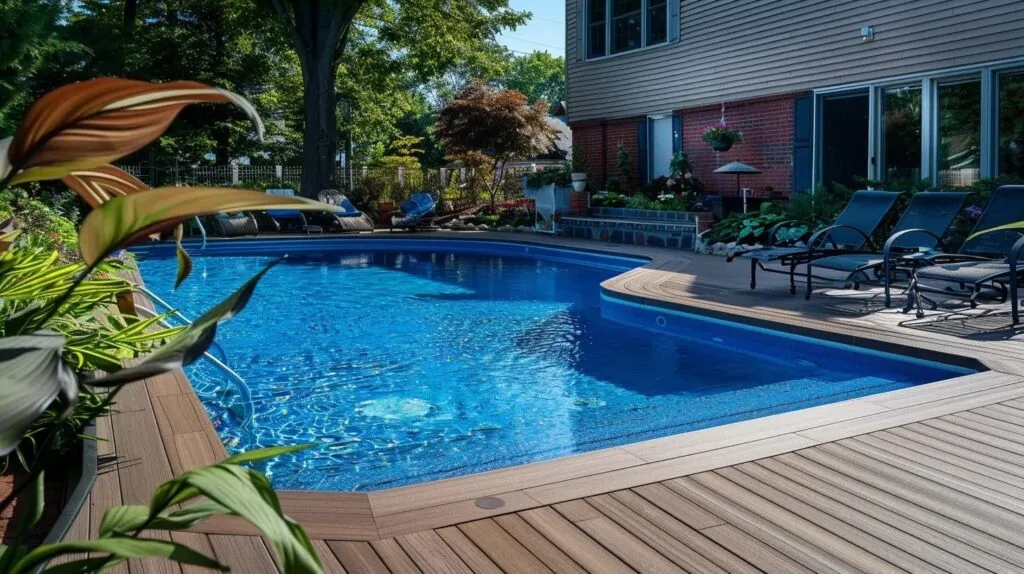
Composite decking is a practical choice for pool areas due to its resistance to climate and insect damage. Unlike wood, composite materials do not warp or suffer from termite damage, making them a durable option.
They are typically priced between stamped concrete and natural stone, offering a balance between affordability and appearance. Composite decking is ideal for homeowners who want the look of wood without the associated maintenance.
F. Tile
Tile decking, including durable options like limestone, adds sophistication to pool areas. While it may be more expensive than some materials, tile enhances the property’s aesthetic value and is resistant to stains, making it easy to clean.
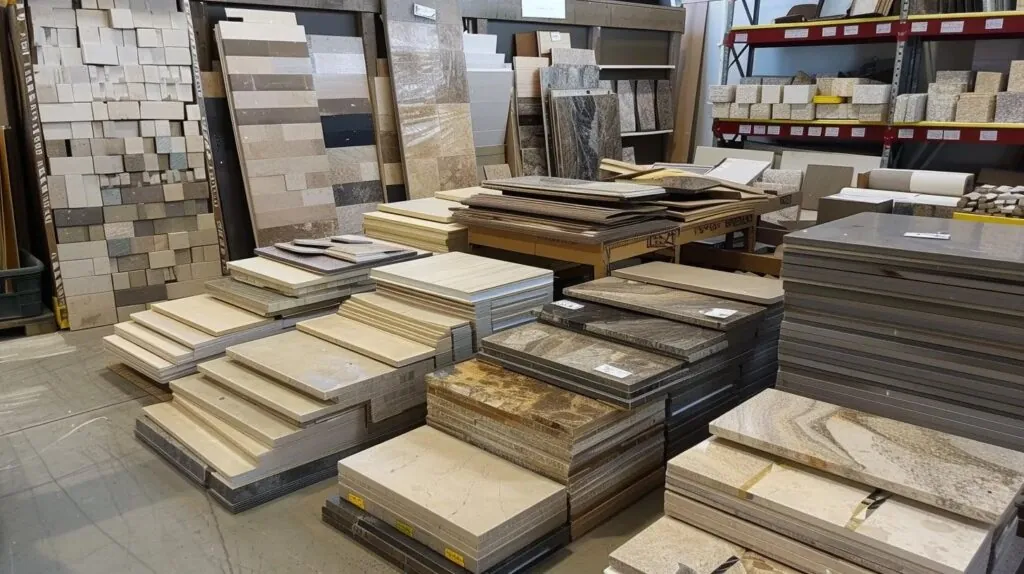
Its low maintenance requirements are an added benefit, making tile a practical yet upscale option for those seeking a refined look for their pool deck. This option is worth considering for a finer and more refined look.
G. Artificial Turf
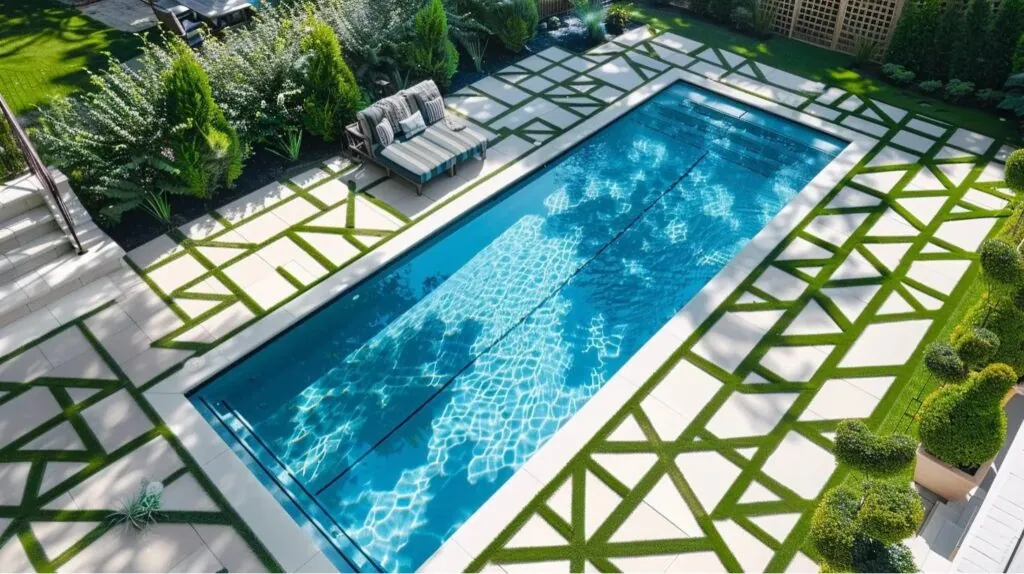
Artificial turf provides a low-maintenance alternative to natural grass for pool decks, offering an inviting look and feel. Made from synthetic fibers, it offers durability and resistance to fading, retaining its vibrant appearance without regular mowing or watering.
The installation typically includes a base layer for proper drainage, making it a functional and attractive option for homeowners who want the look of grass with minimal upkeep.
III. How Do Yard Types Affect Your Pool Decking Choices?
To avoid costly future adjustments, choosing pool decking involves considering the yard’s characteristics, such as soil type and slope. Selecting decking that looks good and suits the landscape’s practical needs is essential, ensuring both functionality and visual appeal.
A. Impact of Soil Types
The soil type in your yard affects the stability of pool decking and the longevity of your outdoor pool decking system and setup. Sandy soil offers good drainage but requires a stable foundation to prevent decking from sagging. Conversely, clay soil expands and contracts, requiring sturdier decking to handle these changes.
B. Dealing with Sloped Yards
Sloped yards pose challenges, such as integrating stairs for pool access and ensuring decking withstands additional wear from the incline. Engineered wood is a practical choice for sloped landscapes due to its strength and ability to maintain a level surface. This decking accommodates the yard’s contours, providing safety and visual consistency.
C. Access to Utilities
The layout and location of utilities like water lines, electrical systems, and drainage also impact pool decking choices. Planning decking installation around these features in yards with existing utilities is vital to avoid costly relocations or damage. For instance, if utilities are buried close to the pool area, you might need to select decking materials that allow for easy access or modifications.
Relates Post: How Much Does a Deck Cost Around An Above Ground Pool?
IV. Why Add Decking Around Your Pool?
Adding a deck around your pool enhances safety, comfort, and functionality. It provides a non-slip surface that reduces the risk of falls, which is crucial for children and the elderly. Decking also creates a defined area for lounging and socializing, making the pool more enjoyable and practical.
By extending your living space outdoors, a deck can improve overall usability and create a more inviting environment for gatherings. Overall, a pool deck enhances your pool area’s safety and enjoyment, making it a valuable addition to your home.
V. How to Choose the Best Pool Decking for Your Needs?
Searching for suitable pool decking requires evaluating durability, safety, and aesthetics to ensure it enhances outdoor space and provides long-lasting enjoyment. Understanding these factors is essential for making an informed decision.
A. Key Factors to Consider
Maintenance is essential when selecting pool decking. For materials like tiles or pavers, grout lines need regular attention to avoid uneven surfaces and safety hazards. The choice of framing materials, such as lumber or steel, is also essential. These materials must be structurally sound and resistant to weather conditions and pool chemicals. Proper selection and upkeep of decking and framing components are crucial for ensuring the deck’s durability and safety.
B. Timing and Considerations for Deck Construction
Timing is essential for pool deck construction to avoid weather-related issues. Mild weather is ideal for materials like teak or precast concrete to ensure proper curing. Planning the construction timeline, including wall installation and design application stages, helps prevent delays. Coordinating these factors effectively ensures a smooth installation and a well-executed final result that adds value and appeal to your home.
VI. What Should You Know About Swimming Pool Deck Considerations?
Balancing privacy concerns and material choices is crucial when adding a pool deck to your outdoor space. Understanding these factors helps homeowners ensure the deck meets their needs and preferences effectively.
A. Privacy and Material Selection
When selecting materials for a swimming pool decks, consider how they affect privacy and fit with the surrounding area. Clay pavers can enhance privacy and blend with the landscape, while granite offers durability against pool chemicals. Choose decking systems with secure fastenings for stability and privacy, ensuring long-term comfort and seclusion.
B. Understanding Local Regulations and Safety Features
Before constructing a pool deck, check local building codes that affect material choices and design. Compliance with these regulations ensures the pool area is safe and meets legal standards. Durable, slip-resistant materials like PVC decking are recommended for various weather conditions. Staying informed about local codes helps ensure safety and performance. Choosing the right deck building materials for your home is crucial for ensuring a durable and safe pool deck that complies with local building regulations.
C. Choosing and Maintaining Pool Covers and Liners
Pool covers are essential for preventing debris and reducing water evaporation. Select a cover that fits your pool’s needs and style. Pool liners need regular maintenance to keep them functional and visually appealing. Frequent cleaning and inspections help prevent damage and maintain the liner’s effectiveness.
VII. Ready to Design Your Ideal Pool Decking?
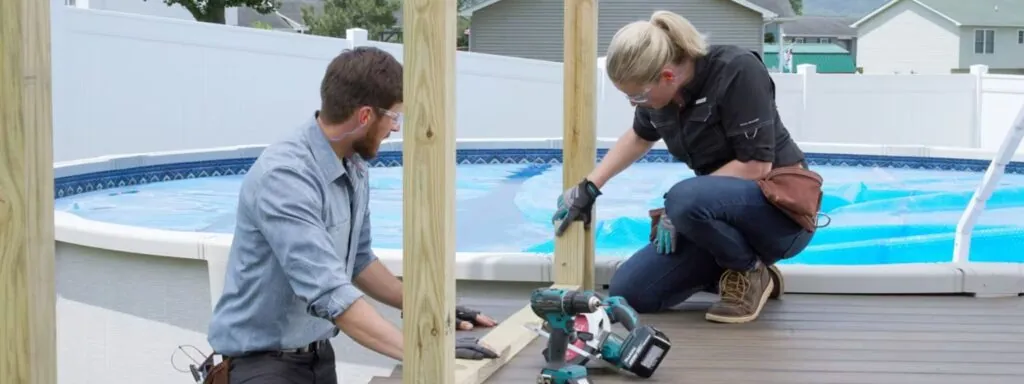
Transform your pool area into a standout feature of your home with a functional and stylish deck. Choosing the suitable materials and designs can turn your outdoor space into a true retreat. Professional deck builders can guide you in selecting options that fit your needs, so you don’t have to rely on DIY solutions that might not deliver the best results. Invest in a high-quality deck to maximize enjoyment and create lasting memories. Start designing and building your perfect pool deck today to make your backyard a go-to spot for relaxation and fun.
Conclusion
Picking the right decking material is key to blending aesthetics with practicality. Each pool decking options—concrete, wood, brick pavers, or composite—offers distinct benefits that affect your deck’s look and performance. Think about maintenance, durability, and how well the material complements your home’s style. A smartly chosen deck boosts your backyard’s charm and increases your home’s value, setting the stage for memorable gatherings and peaceful retreats. Call All Pro CS Decks today to get started!
FAQs
What is the best material for a pool deck?
The best material depends on your priorities. Concrete is durable and customizable, while pavers offer flexibility in style. Wood provides a natural aesthetic, but requires more maintenance. Stone and composite materials are popular for their durability and resistance to weather and pool chemicals. For those considering wood, understanding its maintenance and longevity is crucial. How long does a wood deck last can help make that decision.
How does yard type affect pool deck installation?
Yard factors like soil type and slope influence the stability and longevity of a pool deck. Sandy soil requires a stable foundation, while sloped yards need stronger materials like engineered wood to handle the incline.
What are the maintenance requirements for pool decking?
Maintenance varies by material. Wood requires regular treatments to prevent water damage, while stone and tile need occasional cleaning. Composite materials are low maintenance, resisting climate and insect damage.
Is concrete a good option for pool decking?
Yes, concrete is a popular option due to its durability and customization. It can be stamped, colored, or textured to match your style, making it versatile and cost-effective.
How can I ensure safety around my pool deck?
Opt for slip-resistant materials like stone or PVC decking, and ensure proper drainage to prevent water accumulation. Regularly inspect the surface for any cracks or uneven areas that may pose hazards.
Do I need to follow local regulations when building a pool deck?
Yes, it’s essential to follow local building codes to ensure safety and compliance. These regulations may affect material choice, design, and safety features like slip-resistant surfaces and pool barriers.

